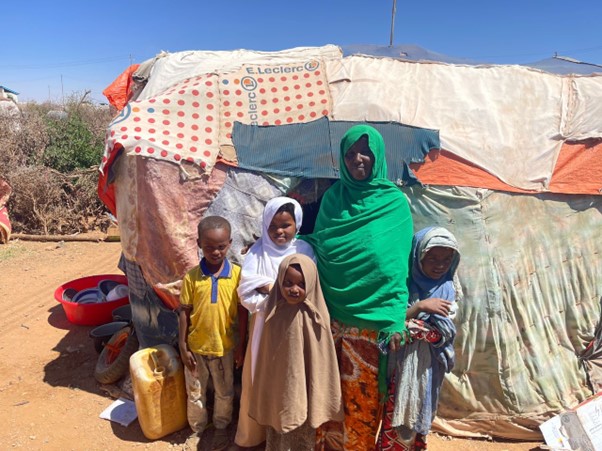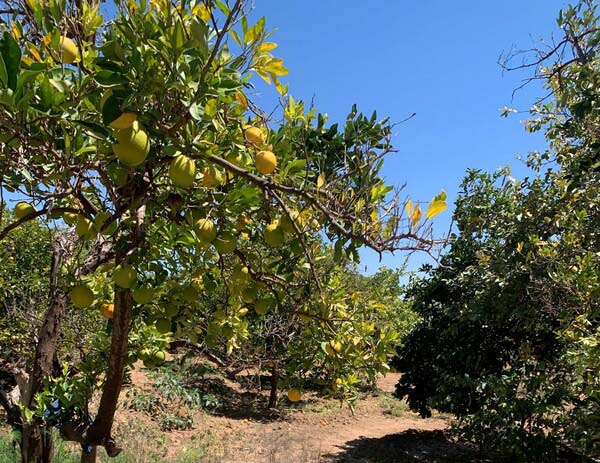East Africa is currently facing the worst drought in decades, and yet there is little to no attention being paid to the severity of the situation. Director of Asia and Humanitarian for ActionAid International, Razmi Farook, visited Somaliland last month to support the response to the food crisis in the region where millions of people are at risk. She shares her experience with us:
Driving through Somaliland, it is clear to see the devastating impact that a drawn-out drought is having on the country.
The land is often barren, with rivers that were completely dried up. I have met families here who are facing chronic food and water shortages. Water resources and agriculture are badly affected, and families have lost their farmland and livestock.
The current drought began in 2020, with below-average rains, and has since deepened.
Compounding the effects of the drought, the region is also facing conflict over Laas Canood City and surrounding villages. Thousands of people- especially women and children – have left their homes with very little, and can’t afford to buy food or water.
The widespread displacement is also increasing pressure on water, food, health, and education services in the host communities.
But there are some signs of hope in parts of the country where people are building their resilience and fighting against climate change.
Displacement and drought
The town of Salahley hosts one of the biggest camps in Somaliland for internally displaced people, where over a thousand people are currently living. These communities are now unlikely to return to their former livelihoods and have precarious and limited opportunities in the places they are hosted.
This area is severely affected by drought, with some households facing the highest levels of food insecurity in the country.
Services in Salahley are incredibly limited, with little access to healthcare facilities, schools, and sustainable water sources. Water often gets transported by trucks or people are forced to use poor quality, undrinkable water, which leads to disease and illness.
Close to the Ethiopian border, many pastoralists pass through in search of water. But the water point in Salahley is salty. Despite this, people still come looking for water as they have no other options.
The rains are expected to be poor again in the upcoming rainy season, and further drought is likely, meaning even more internally displaced people are expected to arrive in Salahley, placing further pressure on local services and the host community.
ActionAid has been in Salahley since 2016, working with local women’s groups to set up safe spaces and deliver training and awareness activities on gender-based violence.
Last year, ActionAid worked with the local camp management committee in Salahley camp to provide cash grants to help 400 families to meet their basic needs.

Suleekha, outside her shop with her family. Photo: ActionAid
One woman invited us into her shop that she had set up with ActionAid’s cash payments.
Suleekha, 31, is the sole breadwinner to her young family of eight since her husband had an accident. Prior to the drought, they owned over 200 animals, but due to the harsh conditions, they all died. She used the first payment to pay off her debts and buy food, and other items for her children’s schooling.
With the second payment, she wanted to make a sustainable investment, so she set up her small shop where she sells vegetables to the community. Despite the challenges she faced, she showed huge resilience and determination to secure a sustainable income for her family and send her children to school.
Improved agriculture and water management
Further west, in Gabiley, where ActionAid has been working since 2006, I was immediately struck by the work that the community had been doing to manage the water sources and cultivate the land. The land was green, and crops were growing well, like a lush oasis in this barren landscape.

Orange trees in Gabiley. Photo: ActionAid
The farmer offered me an orange grown in his small orchard, and the delicious, zesty freshness of the orange cut through my parched mouth and the heat of the day like nothing I’d tasted before.
For me, the sight of the diverse crops, witnessing improved methods of water harvesting, and the conservation of soil and water to adapt to the drought, were like rays of hope.
The community has built sustainable water sources, including shallow wells and earth dams to collect and store water for drinking and irrigation, and trained local committees to help manage and maintain the water sources.
Next, their priority is to get solar panels installed, which means that shallow wells won’t need pumps that use expensive fuel.
Tackling gender-based violence
We were also welcomed into the women’s safe space, where 30 women have been working together to support their whole community.
A key focus for the group is tackling gender-based violence. Survivors of sexual violence had very little recourse to justice before. Since the training offered by ActionAid, the community now takes violence and assault cases to the courts.
Setting up businesses
The women in the coalition pay a small amount per month to support members with any issues they are facing or to help them grow their businesses. Women also receive a grant to invest in farming, transporting vegetables to the markets, and selling clothes.
The group has learned literacy and numeracy skills to grow their businesses and is now able to support their children with their education. They have built their leadership and communication skills, and manage several initiatives.
What is ActionAid doing to help?
Drought has had a severe impact on the environment and the socio-economic welfare of the communities in East Africa.
But it hasn’t just been the drought that the community has been battling; in the last three years, they are also fighting the impact of Covid and dengue fever.
Despite the strong sense of community resilience, these last few years have been really challenging for local communities in the region.
Climate change, land-use change, and socio-political and institutional transitions in East Africa have caused these recurrent droughts.
But a better understanding of the causes and impacts of droughts, participatory management, strong citizen-government, stakeholder cooperation, and community-level actions are essential for building resilience.
In the coming months, ActionAid is expanding its presence across Somalia, seeking to work with local women’s groups to build resilience through improved access to water and adapting farming practices in the face of climate change, and preventing gender-based violence.
With the number of emergencies rapidly growing, raising the awareness and vital funds needed to respond to the crisis remains incredibly challenging.
A donation to our East Africa Crisis Appeal could help us respond quickly and effectively to this disaster. You could help us to save lives and support the rights of women and girls and continue work on long-term sustainable programs.


